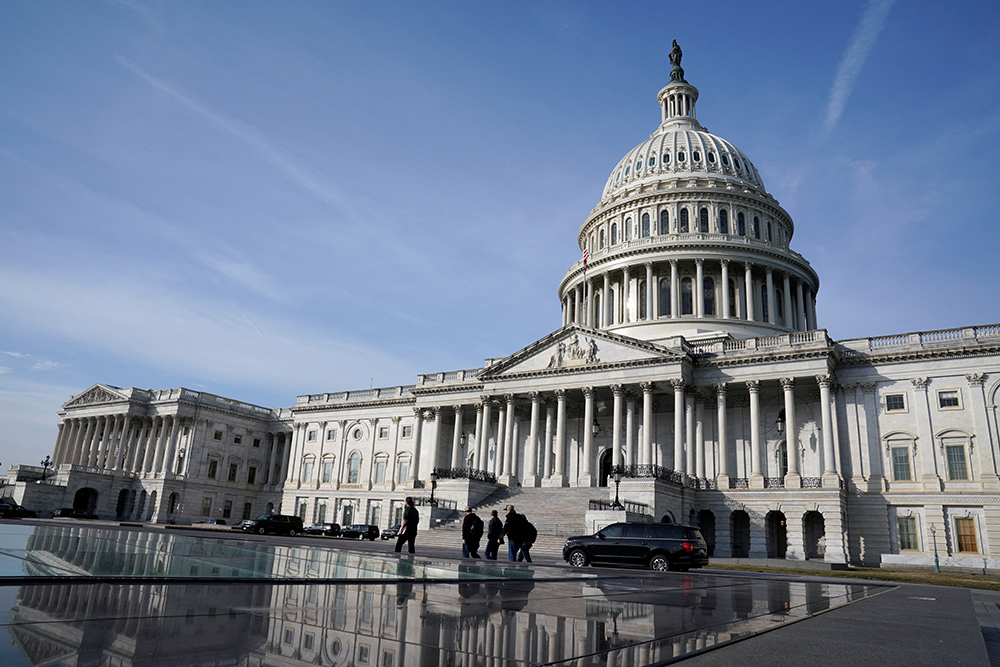
PROSPECT HEIGHTS — With the U.S. House of Representatives set to vote on sweeping immigration legislation this week, the U.S. bishops’ conference migration committee chair has urged legislators to oppose it, deeming it incompatible with Catholic social teaching and the nation’s commitment to humanitarian protection.
Bishop Mark Seitz of El Paso said in a letter to Congress that he doesn’t question the intentions of lawmakers who seek to secure the border or discount the challenges that exist there, but noted the bill “would fundamentally weaken our nation’s decades-long commitment to humanitarian protection.
“This legislation contains such a combination of harmful measures that we believe its passage, on the whole, is beyond justification,” said Bishop Seitz, who leads the U.S. Conference of Catholic Bishops’ Committee on Migration.
H.R. 2, the “Secure the Border Act,” was introduced by Representative Mario Díaz-Balart, R-Fla., earlier this month, and has garnered the support of top lawmakers in the GOP-controlled House as the nation grapples with an ever worsening and unprecedented immigration crisis at the southern border.
The bill includes provisions to limit asylum opportunities for migrants who unlawfully enter the country, limit funding to certain programs and limit the government’s partnership with nongovernmental organizations, restrict the use of parole, and expedite border wall construction.
Balart described it as a reform package that will provide “real, thoughtful solutions to restore order at the southwest border, enhance our national security, and most importantly protect unaccompanied minors.”
Speaker of the House Kevin McCarthy, R-Calif., Majority Leader Steve Scalise, R-La., and other top House Republicans said in a May 2 joint statement that the bill “would end the crisis and restore sanity, safety, and security at our borders.”
However, even if the bill passes the House it is unlikely to get through the Senate, where Democrats maintain a slim majority. The White House also announced on May 8 that President Joe Biden would veto the bill should it come to his desk for a signature.
“While we welcome Congress’ engagement on meaningful steps to address immigration and the challenges at the border, this bill would make things worse, not better,” the White House Office of Management and Budget said in a statement. “Because this bill does very little to actually increase border security while doing a great deal to trample on the nation’s core values and international obligations, it should be rejected.”
The bill goes against the kind of immigration policies the U.S. bishops have called for, mainly long-term measures that address root causes of why people flee their home countries.
Chief among Bishop Seitz’s criticisms of the legislation is the fact that the legislation would subject unaccompanied minors and families with children to indefinite detention by the Department of Homeland Security (DHS).
It would also subject unaccompanied minors to an expedited screening and for those deemed eligible at the time, appearance before an immigration judge within 14 days, which Bishop Seitz said doesn’t give minors “meaningful” access to legal counsel or a child advocate. A government-funded representation program would be abolished, as well.
Bishop Seitz further took issue with how the bill would limit asylum. It would eliminate the asylum possibility for anyone who enters the U.S. in between ports of entry with no exceptions, and in general would make it more difficult for anyone to claim asylum at a port of entry. It would attach a $50 fee for each asylum application without the possibility of a waiver, as well.
Another point of contention is a measure that would require eligible asylum-seekers to reapply for employment authorization every six months, which could compound an already yearslong backlog on the employment reauthorization process.
Bishop Seitz also fears that vague language in a provision that would prevent DHS funding to any nongovernmental organization that is deemed to facilitate unlawful entry, or provide myriad services to migrants — including transportation, lodging, and legal services — could have an outsized effect on Catholic organizations that are vital to the nation’s migration response.
Further, the bill would restrict the use of parole, which has been a cornerstone of the Biden administration’s border policy to date, providing the opportunity for highly vulnerable migrants from certain countries to live and work in the U.S. for a period of two years.
Instead of these types of measures, Bishop Seitz encouraged Congress to focus on long-term solutions. Congress hasn’t passed a substantial immigration reform bill since the 1986 Immigration Reform and Control Act.
“We take this opportunity to reiterate that ‘no combination of legal pathways or harsh enforcement measures will suffice to meet the complex challenge of forced migration facing our country and hemisphere,’ ” Bishop Seitz said. “ ‘Only through a long-term commitment to addressing root causes and promoting integral human development throughout the Americas, combined with an overhaul of our immigration system, will we be able to achieve the conditions necessary to sustainably reduce irregular migration.’
“We urge you to oppose the passage of H.R. 2 and to support drafting bipartisan legislation that is more in keeping with our nation’s rich tradition of welcome,” he continued.
